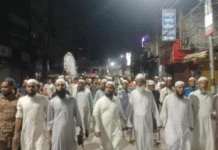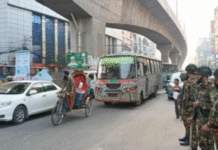Military hardware worth Tk 15,104cr procured in five years, more in pipeline; focus on modernising armed forces
The Awami League-led grand alliance government has so far procured military hardware worth Tk 15,104 crore as part of its initiative to modernise the armed forces and enhance defence capabilities.
Procurement of another Tk 10,000 crore military hardware and technology is in the pipeline under two deals — one signed with Russia in January and the other with Belarus last month, said sources in the army.
Moreover, a move to buy two off-the-shelf submarines for the navy is on. A letter of intent has already been issued in this regard. The two submarines might be bought either from the US or China under a government to government agreement.
Those already procured include radars, tanks, various types of aircraft, helicopters, missiles, frigates, survey ships and self-propelled guns. These were procured from China, France, Germany, Italy, Japan, Russia, Serbia and the UK.
Statistics of defence purchase from fiscal year 2008-09 to 2012-13 show highest Tk 5,407.27 crore was spent for the army followed by Tk 4,975.49 crore for the navy. Air force purchase stood at Tk 4,722.13 crore.
China remains Bangladesh’s largest supplier, accounting for more than half the country’s defence purchase worth Tk 7,400 during the current government.
During the time, the army got 44 tanks, three armed recovery vehicles (ARV) and two weapon-locating radars from China while 184 three-tonne capacity Japanese lorries, 275 armed personnel carriers (APC), 15 ARV ambulances and 113 tank destroyer equipment (ATGW) from Russia. It also got two helicopters from France and 18 self-propelled guns from Serbia, according to the sources.
Given the importance of maritime boundary, the government has put the highest importance on equipping the navy with new frigates, patrol ships, warships, missiles and maritime aircraft in the last four and a half years.
Two frigates, two new small warships, two large patrol ships and five patrol craft were procured from China. Two radars and fire control systems and 50 missiles (C-704) were also bought from China.
In addition, two Italy-made maritime helicopters and five MK-2 missiles, two German-made maritime aircraft and three ships made by the UK were added to the navy force.
The navy is also hoping to be equipped with two submarines by 2016. The government is in talks with China and the US in this regard. Estimated cost of a China-made submarine is Tk 4,000 crore while a US-made one may cost double the sum.
Prime Minister Sheikh Hasina inaugurated three warships in Chittagong on Thursday.
A move is underway to acquire land in Pekua upazila (near Kutubdia channel) of Cox’s Bazar to establish a submarine harbour.
Six navy personnel are now in Golcuk, Turkey, for training on operation of submarine. Five more will be sent once they return, said sources in the navy.
There was no purchase for the air force in fiscal year 2009-10 but the following three years saw a huge purchase from China and Russia. These include 16 F-7 BG1 planes from China and three MI-171SH helicopters from Russia.
The air force also got SHORAD, an air defence system, overhauling facilities for F-7 planes, PL-9C missiles for F-7 plane, four air defence radars and overhauling of MIG-29 planes during the time.
Justifying expenditure on defence hardware, former army chief Maj Gen (retd) Mahbubur Rahman said, “Considering our geopolitical, geostrategical, geoeconomical and geographical context, the purchase was very much important to strengthen our armed forces.”
He said Bangladesh’s neighbours India, Myanmar and China have multiplied their military might.
“We have the Bay of Bengal. If we want to establish our rights and authorities on the water territory and its resources, we have no alternative but to strengthen the army, navy and air force,” said Mahbubur, a standing committee member of the BNP.
He termed “very much logical” the move to buy submarines for the navy. “We of course need submarines.”
Former chief of army staff Lt Gen (retd) Harun-Ar Rashid has said Bangladesh armed forces operate not only in the country. They also work with militaries of other countries in the UN Peacekeeping Mission.
“So our armed forces must be modernised so they can remain in the race with other countries’ armed forces,” he said.
Asked how he looked at such huge defence budget, the former army chief said the issue of modernising the armed forces had not got due priority in the past. “It has got due attention from the government this time. Everybody should take it positively.”
Harun, however, added that education, health and housing should get priority over the armed forces in terms of the budgetary allocation.
Both the former army chiefs said they believed defence allocation in Bangladesh was the lowest in the sub-continent.
A former navy chief said strengthening the navy became very important given the fact that Bangladesh now had more maritime area than its land area.
“A good navy equipped with air, marine and submarine equipment is a must to ensure a good economy. It is more so because 99 percent imports of the country come through the sea,” he said.
The navy is on duty round the clock to check piracy, provide security to trade and oil and gas exploration. Strengthening the navy also means it will be able to play a stronger role in the UN Peacekeeping Mission, he added.
DEAL WITH RUSSIA
On January 15, Dhaka and Moscow signed a $1 billion (around Tk 8,000 crore) deal under which Bangladesh will procure military arms and equipment from Russia.
They include armoured vehicles and infantry weapons, air defence systems, training aircraft, anti-tank missiles and Mi-17 transport helicopters.
RIA Novosti, one of the largest news agencies in Russia, reported that details of the deal were unknown but Russian military analyst Igor Korotchenko said Bangladesh was likely to buy about 80 to 100 Russia-made BTR-80 amphibious armoured personnel carriers (APCs) and some missile defence systems.
DEAL WITH BELARUS
Bangladesh signed seven deals with Belarus during Hasina’s visit to the East European country last month. A deal on military and technological cooperation was also signed during the visit but it was kept entirely secret.
Like many past deals, the government disclosed nothing about the defence pact.
However, bits and pieces of defence purchase became public through various speeches of the prime minister, who on February 27 offered some details in this regard in her speech in parliament.
Hasina said her government had moved to purchase two submarines and a coast guard cutter for the navy.
“Moves are on to purchase two submarines from a friendly country,” she said without naming the country. But she said the coast guard cutter will be bought from the US.
In her scripted answer, the premier said her government had already bought missiles and torpedoes for destroying ship and depth charges, rocket launchers, canons, radars and other weapons for the navy.
She said two new army commands and an infantry division, two air defence brigades and more than one armoured, artillery and engineering battalion and other supportive units will be added to the army to strengthen the force as part of implementing the force’s goal-2030.
The goal will be implemented in four phases in light of the defence policy formulated by the Bangabandhu-led government in 1974.
Besides, Hasina said, the government had moved to purchase fourth generation MBT-2000 tanks, multi-launcher rocket system, weapon-locating radar, automatic grenade launcher, anti-tank weapon, non-guided anti-tank weapon and anti-tank guided missiles for the army.
She also mentioned that a process was underway to purchase modern euro-copter, light fixed-wing aircraft and armoured and anti-air weapons for the army.
To modernise the air force under the goal-2030, she added, her government had moved to buy air defence radars, fighter planes and air-to-air missiles.
On June 13 last year, Planning Minister AK Khandker, who is in charge of the House committee on the defence ministry, told parliament that the government had moved to purchase two off-the-shelf frigates, two large patrol craft, two maritime patrol aircraft and five patrol craft for the navy.
The government allocated Tk 14,458 crore for defence in the budget for fiscal year 2013-14, the second highest after education, which got Tk 25,114 crore.
Source: The Daily Star










